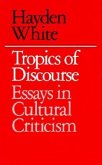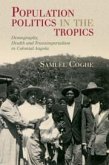The Austrian Empire was not a colonial power in the sense that fellow actors like 19th-century England and France were. It nevertheless oversaw a multinational federation where the capital of Vienna was unmistakably linked with its eastern periphery in a quasi-colonial arrangement that inevitably shaped the cultural and intellectual life of the Habsburg Empire. This was particularly evident in the era's colonial utopian writing, and Tropics of Vienna blends literary criticism, cultural theory, and historical analysis to illuminate this curious genre. By analyzing the works of Leopold von Sacher-Masoch, Theodor Herzl, Joseph Roth, and other representative Austrian writers, it reveals a shared longing for alternative social and spatial configurations beyond the concept of the "nation-state" prevalent at the time.
Bitte wählen Sie Ihr Anliegen aus.
Rechnungen
Retourenschein anfordern
Bestellstatus
Storno








